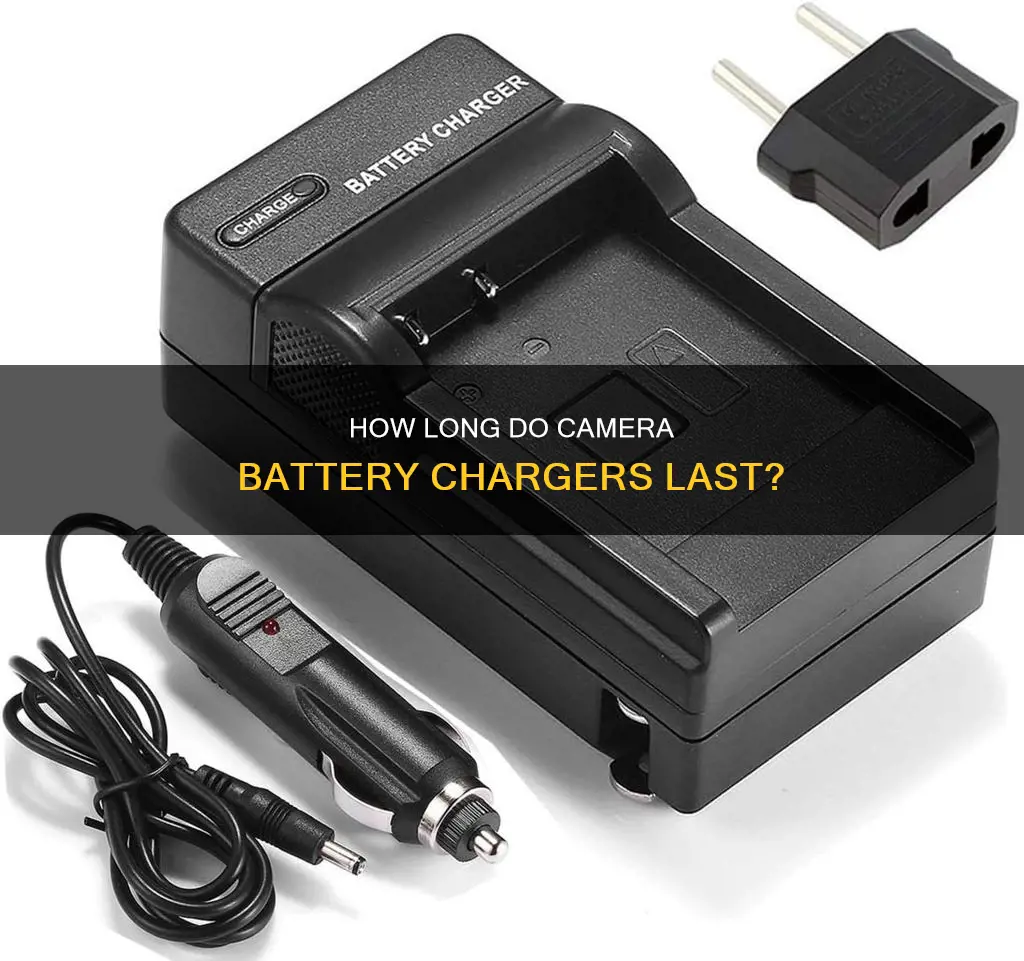
Camera battery chargers are a crucial component of any photographer's toolkit, but do they have an expiry date? This is a question that many camera owners grapple with, especially when their batteries start to show signs of ageing. The answer is nuanced. While camera battery chargers don't necessarily go bad in the traditional sense, their effectiveness can diminish over time, and improper use can lead to safety hazards and reduced battery performance.
What You'll Learn
- Camera battery chargers have built-in safeguards to prevent overcharging
- Leaving a camera battery in the charger overnight will not damage it
- Camera batteries should be stored in a cool, dry place
- Camera batteries should not be left in the charger for extended periods
- Camera batteries should be charged and discharged at least once every six months

Camera battery chargers have built-in safeguards to prevent overcharging
Modern smartphones and wall chargers are smarter with managing power and will gradually reduce the amount of current as the phone fills up. Additionally, many camera manufacturers have implemented intelligent charging systems that optimize the charging process and minimize the risk of overcharging. These systems monitor the battery's voltage and adjust the charging current accordingly, ensuring that the battery does not get overcharged.
It is important to note that no battery is completely immune to overcharging. In rare cases, the protection circuitry may fail, or the charger being used may not be compatible with the battery, which can lead to overcharging. To minimize the risk of overcharging, it is recommended to use the charger provided by the camera manufacturer or a reputable third-party charger specifically designed for the camera battery.
Furthermore, modern camera batteries often have built-in thermal protection mechanisms that detect excessive heat during charging and automatically shut down the charging process to prevent damage. This is crucial because overcharging can generate heat, which can be dangerous and potentially lead to battery failure or even fire.
By following the manufacturer's instructions and using the recommended charging equipment, you can ensure the safe and optimal charging of your camera batteries while taking advantage of the built-in safeguards that prevent overcharging.
How to Prepare Your Polaroid Camera for Instant Shots
You may want to see also

Leaving a camera battery in the charger overnight will not damage it
However, it is still best practice to avoid leaving your battery in the charger for extended periods. While the risk of overcharging is low, doing so can still impact the performance and lifespan of your battery. This is because the battery remains at high temperatures for a more extended period, which can affect its health.
To maintain a healthy battery, it is recommended to follow the manufacturer's guidelines, use quality charging equipment, and keep the charge between 30% and 90%. Additionally, giving your battery breaks from continuous charging can help prolong its life.
It is also worth noting that older battery chargers may not have the same overcharge protection as modern ones, so it is always important to check the specific model you are using. However, even with older models, the risk of damaging your battery by leaving it in the charger overnight is relatively low.
Charging Your Lumix Camera Battery: No Charger Required
You may want to see also

Camera batteries should be stored in a cool, dry place
It is important to note that rechargeable lithium-ion batteries, which are commonly used in cameras, can be damaged if they are not properly charged or stored. When storing rechargeable lithium-ion camera batteries, it is recommended to keep them at around 40-60% charge. Storing them at full charge can reduce their lifespan. Additionally, it is important to use a charger that is specifically designed for lithium-ion batteries to avoid overcharging, which can cause the batteries to catch fire or explode.
When storing camera equipment for extended periods, it is generally recommended to remove the batteries and store them separately. This is because batteries can leak acid or corrosive gas over time, which could damage the camera. Storing camera equipment in a dry, airtight container or bag with silica gel can help to prevent moisture buildup and the growth of mould or fungus.
It is also important to consider the environment in which the camera batteries are stored. Avoid storing them in direct sunlight or areas with extreme temperature changes, such as near radiators. Additionally, keep the battery contacts from touching each other or any metal objects to prevent short circuits and potential fires.
Why 18650 Batteries Are Popular in Cameras
You may want to see also

Camera batteries should not be left in the charger for extended periods
It is generally safe to leave charged batteries in a charger that is unplugged from the wall and stored in a camera bag. However, the battery will drain slightly faster than if it were not left in the charger. This is a minor issue and not something worth worrying about, as the time spent testing the battery discharge would be wasted.
For longer-term storage, it is best to remove the battery from the charger and camera and store it separately. Storing the battery at around half charge is recommended to maintain its longevity. This is especially important if the camera will not be used for an extended period, as a small amount of power current can be released, leading to excess discharge and shorter battery life.
In summary, while it may be convenient to leave camera batteries in the charger, it is not advisable to do so for extended periods. The best practice is to remove the batteries from the charger once they are fully charged and store them separately, maintaining a charge of around half for optimal longevity.
Charging Olympus Camera Batteries: Where and How?
You may want to see also

Camera batteries should be charged and discharged at least once every six months
When storing camera batteries for long periods, it is recommended to keep them at a charge of around 40-50%. Storing batteries with a full or completely drained charge can damage the battery's performance and lifespan. It is also important to store camera batteries in a cool, dry place, as high temperatures can damage batteries and impair their performance. Additionally, condensation can form inside the battery if it is subjected to sudden changes in temperature, so it is advisable to place the battery in a carrying case or plastic bag before exposing it to temperature changes.
It is worth noting that different camera batteries may have specific storage requirements. For example, some batteries may be stored inside the camera for a few weeks without any issues, while others may drain the battery faster. Therefore, it is always a good idea to check the camera's manual for specific instructions on battery storage and care.
Furthermore, it is important to use only batteries approved for your camera equipment and to keep the battery terminals clean. This will help ensure the optimal performance and longevity of your camera batteries.
Charging Sling Studio Camera Link: A Step-by-Step Guide
You may want to see also
Frequently asked questions
Lithium-ion batteries have built-in safeguards to prevent overcharging. However, it is still recommended to use the charger specifically designed for your camera's battery to avoid any potential issues.
It is generally recommended to charge your camera battery until the charger indicates that it is fully charged. This can vary depending on your camera model; refer to your user manual for specific instructions.
If you won't be using your camera battery for an extended period, it is recommended to remove the battery from the camera and store it in a cool, dry place. Ideally, the storage temperature should be between 15°C and 25°C (59°F and 77°F). Additionally, charge and discharge the battery at least once every six months to maintain its performance.







